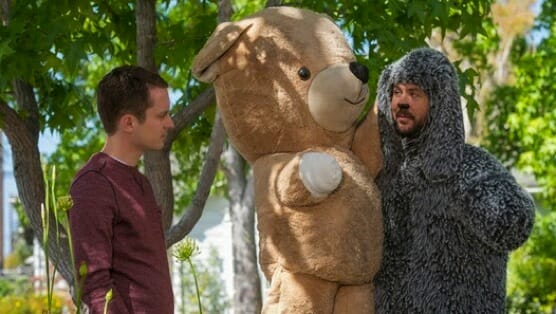Wilfred: “Resistance/Happiness”
(Episodes 4.10)

Television endings are hard.
I’m sure even in the case of the most celebrated series finales such as Six Feet Under’s “Everyone’s Waiting,” M*A*S*H’s “Goodbye, Farewell and Amen” or Next Generation’s “All Good Things…,” there are some people who view them with the same contempt that others hold for the finales for Seinfeld, Quantum Leap or—God forbid—Lumberjack Dexter. The fact remains that it’s impossible to please everyone. And while some will no doubt grumble about the relative simplicity of Wilfred’s final hour, it remains an impressive and poignant conclusion that anyone who’s grown with the show should find something to latch onto.
In any case, let’s talk about the mystery of Wilfred right off the bat. It turns out the simplest answer is sometimes the right one. Wilfred is neither a god, a demon or any form of an alien; rather, he’s merely all in Ryan’s head, a way of dealing with the turmoil of his life. That’s not to say the show’s entire mythology has all been a cheap misdirect. While not explicitly laid out, it’s clear that Ryan’s past experience, whether it involved his years in the Cult of the Grey Shepard as a toddler or his traumatic experience with Sneakers have all merged and resulted in the manifestation of a man dressed in a dog suit. Is it the most mind-blowing concept? No. But it’s what works for the show.
The two-part finale begins with “Resistance,” which carries over from last week’s monumental shift. Ryan, at long last, is now in a relationship with Jenna, while Wilfred is now knocking at death’s door. Needless to say, it’s a bittersweet time for Ryan. To complicate matters, Jenna’s estranged husband Drew comes barreling back into the picture. In the wake of Wilfred’s death, Drew seems determined to win her back.
For his part, Wilfred is incensed. If Jenna ends up with Drew again, it means that he will have failed his ultimate purpose—to lead Ryan to happiness. Wilfred goes into an emotional fit which eventually leads to him collapsing. An emergency visit to the vet confirms the worst—Wilfred has reached the end, and all that’s left to do is say goodbye. After an emotional Jenna leaves the room, Ryan is left alone with his friend. Via some form of mental connection, the two end up in a beautiful, heavenly area that looks to be the real-life location of the painting from the basement.
After a quick game of catch, the two say their goodbyes. We then bear witness to one of the most heartbreaking shots of the series—as a tearful Ryan bends down next to Wilfred’s dead body, the camera moves up and we see Wilfred as the rest of the world sees him—a cute, shaggy dog. Ryan is further crushed when Jenna announces that she is moving back to Wisconsin with Drew. A devastated and angry Ryan ends the episode by tossing Wilfred’s tennis ball into the ocean.
The subsequent episode, “Happiness,” draws an explicit parallel to the pilot episode, not only in its title (the first episode was also called “Happiness”), but in its opening scene. Here, Ryan once again preps himself for suicide. This time, there’s little fretting about the wording of his note and, upon seeing Jenna loading up her car, he bids adieu with bitterness rather than longing. He only gets in the briefest sip of his pill-heavy smoothie, however, before Catherine bursts in, putting the brakes on his death wish. Her visit culminates in a big revelation. In the wake of Kristen’s birth (ah, Kristen—always messing things up), Catherine began to feel more and more distant from her husband. She ended up taking off to leave with the charismatic Charles, who founded the Cult of the Grey Shepard. Enticed by his ideas, she ended up shacking up with him, which resulted in the birth of Ryan. Charles latched onto the idea that Ryan was a “Chosen One,” and started performing bizarre ceremonies. It was then that Henry swooped in and took his family away from this mania. Charles subsequently was placed in prison, and died there (more on that later).
-

-

-

-

-

-

-

-

-

-

-

-

-

-

-

-

-

-

-

-

-

-

-

-

-

-

-

-

-

-

-

-

-

-

-

-

-

-

-

-








































